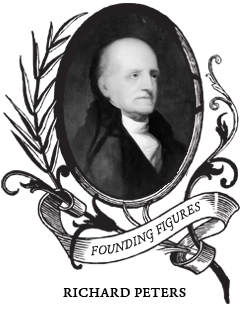Delegate to the Continental Congress, Secretary to the Board of War, speaker of the Pennsylvania House of Representatives, Judge of the U.S. District Court of Pennsylvania, Richard Peters worked with many of the founders of the new nation. Although he was a charter member of the Society, he did not attend many meetings early on because in 1787 he founded the Blockley and Merion Society for Agriculture and Rural Affairs, of which he was president until his death. With the revival of the Philadelphia Society in 1805, however, Peters became president, heading the group during its most prestigious period. A wealthy landowner and gentleman farmer, Peters conducted agricultural experiments on his estate, called Belmont, now within and part of Fairmont Park in Philadelphia. Considered very knowledgeable about agricultural matters, many people wrote to him for advice. Notably, when George Washington found that his wheat had been infected with the Hessian fly, he asked Peters what he should do. Peters most important and influential work was a 1797 pamphlet entitled “Agricultural Enquiries on Plaister of Paris” which over time contributed to more productive farming practices.
It was under Richard Peters’ leadership that the Society began its publication programs. The first volume of the Society’s Memoirs appeared in 1808 and the fifth volume, the last published in the nineteenth century, came out in 1826. While many of the articles were written by Peters, important communications by others, many in response to the Society’s competitive premiums awards, made these volumes into valuable sources of information on the latest and best farming practices. Since the practical farmer was not attracted to these volumes, however, beginning in 1816 the Society sponsored the publication of the Agricultural Almanac, which presented the information in an abbreviated and popular form.

